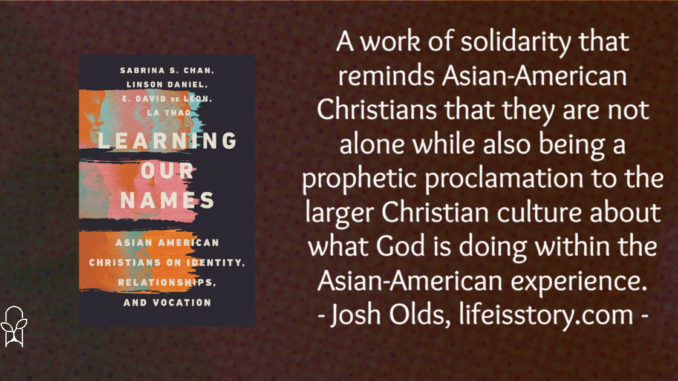
Published by IVP on August 30, 2022
Genres: Non-Fiction, Christian Life, Racial Reconciliation
Buy on Amazon
Goodreads

What's your name?
Asian Americans know the pain of being called names that deny our humanity. We may toggle back and forth between different names as a survival strategy. But it's a challenge to discern what names reflect our true identities as Asian Americans and as Christians. In an era when Asians face ongoing discrimination and marginalization, it can be hard to live into God's calling for our lives.
Asian American Christians need to hear and own our diverse stories beyond the cultural expectations of the model minority or perpetual foreigner. A team from East Asian, Southeast Asian, and South Asian backgrounds explores what it means to learn our names and be seen by God. They encourage us to know our history, telling diverse stories of the Asian diaspora in America who have been shaped and misshaped by migration, culture, and faith. As we live in the multiple tensions of being Asian American Christians, we can discover who we are and what God may have in store for us and our communities.
From 2013-2020, I served as a pastor at a primarily Asian-American church. Growing up in an almost exclusively white environment, I was not at all prepared to suddenly be working with a congregation that had more Asian people than my entire hometown. Fortunately, that church loved me and taught me either explicitly or through experience and trial and error how to engage with and understand their cultural backgrounds. And while there’s no substitute for loving teachers and experience, Learning Our Names is the book I wish I had going into that ministry.
Written by four Asian-American Christian leaders, Learning Our Names is a volume of reflection on identity, relationships, and vocation. Some of the most impactful chapters come in the section on relationships, as the authors reflect on the stories of their parents and the cultural value of honoring parents—and their culture—while adapting to a different society. Sabrina Chan, direction of Asian American ministries for InterVarsity, writes about growing partnerships and growing in leadership. Linson Daniel, pastor of METRO Church and coordinator for South Asian InterVarsity writes on church, vocation, and partnerships. E. David de Leon, director of InterVarsity’s Global Urban Trek, focuses on ethnic identity. La Thao, part of InterVarsity’s campus staff, writes about parents, singleness, and religious diversity.
Each author also represents a different ethnic facet of the larger Asian-American conglomerate. Asia is a big place and piling all Asian-American into monolithic heading often means that in broadly Asian-American studies, the perspective comes only from one majority culture—usually Chinese or maybe Indian. Learning Our Names offers a variety of Asian-American experiences. Sabrina Chan’s parents immigrated from Hong Kong. Linson Daniel is Indian American. E. David De Leon is Pilipino American. La Thao is Hmong American. Each of these are distinct and unique backgrounds, both in terms of ethnicity but also in terms of how those identities have been colonized and how those ethnicities are perceived within the larger American culture. The result is a book that is nuanced and contains things to learn, even if you already feel familiar with or are a part of an Asian culture.
Linson Daniel writes an amazing chapter on finding a home at church that should be mandatory reading for youth in Asian churches. He talks about the tension of growing up in an ethnic-specific church and how we just draw a distinction between ethnic-specific ministry and ethnocentric ministry. This chapter could really be expanded into a whole book for those growing up and leaving their home church. It’s hard enough to leave a church at high school graduation anyway. Add in the cultural expectations and elements and knowing that you’ll be just as misunderstood from a different side in most other churches makes transitioning to a church as an adult quite difficult. Daniel offers wise advice from someone who has gone through that journey.
Learning Our Names is a work of solidarity that provides Asian-American Christians with the reassurance that they are not alone. It’s also a prophetic proclamation to the larger Christian culture about what God is doing within the Asian-American experience. It celebrates a distinctly Asian faith and Asian identity that shows that you do not have to become more American to be Christian, while also recognizing the cultural changes that comes with immigration. The authors speak from experience and speak from the heart. This is a needed volume both Asian-Americans and larger Christian community alike.
